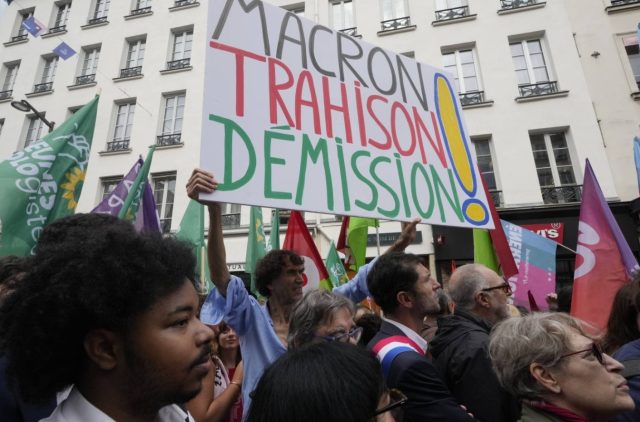Protests have erupted across France following President Emmanuel Macron’s decision to appoint conservative politician Michel Barnier as the new Prime Minister. The appointment has angered left-wing factions, as Barnier’s party did not secure a majority in the July legislative elections, where the left-wing bloc claimed more seats. Demonstrations denouncing Macron’s decision as a “power grab” took place on Saturday in several French cities, with protesters criticizing the president for disregarding the election results.
Mass Protests Across France
Tens of thousands of demonstrators took to the streets in protest, with 160,000 people marching in Paris and an estimated 300,000 participating in 150 other demonstrations throughout the country. France’s left-wing political coalition, the New Popular Front, which includes socialists, communists, environmentalists, and the left-wing radical party La France Insoumise (LFI), led the protests. Jean-Luc Mélenchon, leader of LFI, condemned Macron’s decision, calling for long-term resistance and accusing the president of failing to respect the democratic process.
Macron’s Controversial Decision
In France, the president has the power to appoint the prime minister, usually selecting someone from the winning party or coalition. However, Macron’s decision to appoint Michel Barnier, a member of the conservative Les Républicains, has been seen as an attempt to avoid a difficult cohabitation with the left-leaning New Popular Front. Barnier, a former EU Commissioner and Brexit negotiator, has pledged to lead a pragmatic government, independent of Macron and without “red lines.”
A Divided Government
While Barnier has expressed his willingness to work with moderate parties, his government faces criticism from both the left and far-right. Left-wing leaders have refused to join Barnier’s administration, while Marine Le Pen’s far-right Rassemblement National (RN) is expected to play a significant role in the upcoming parliamentary debates. The left has announced plans to submit a vote of no confidence when parliament reconvenes, but with no clear majority either for or against the government, it remains uncertain whether Barnier’s government will face significant opposition.
France’s Political Future
As Barnier navigates a divided parliament, his success may depend on balancing cooperation with various political factions. While some accuse Macron of aligning himself with the far right, others see Barnier’s appointment as a necessary compromise to ensure stable governance in France. His next steps will be closely watched by both supporters and critics as he begins his term as prime minister.





